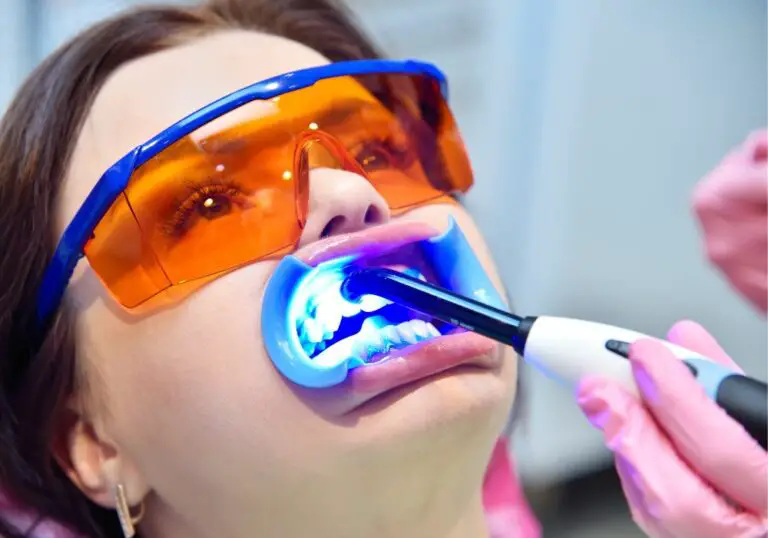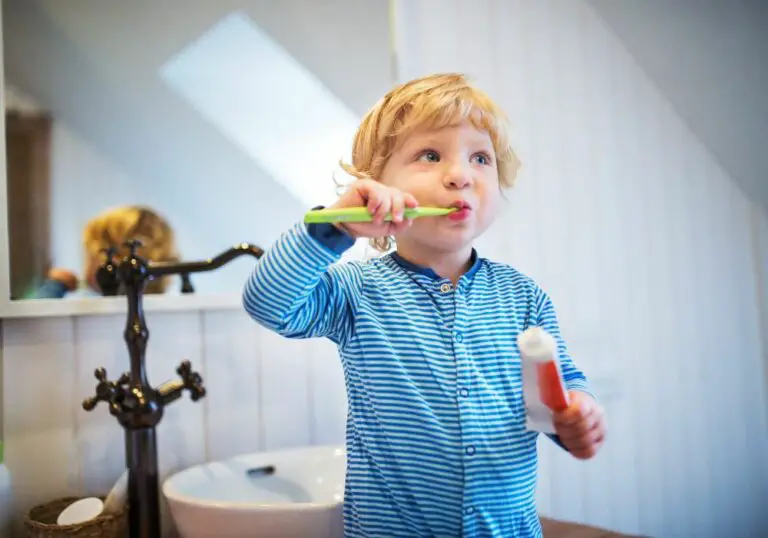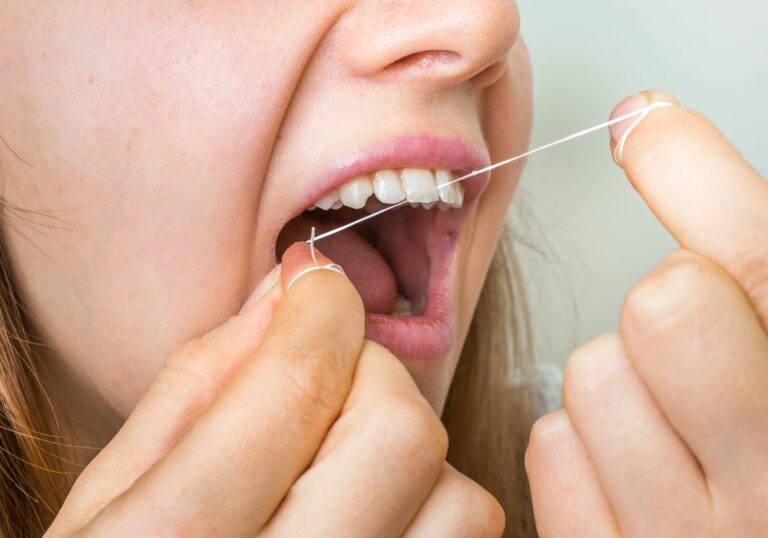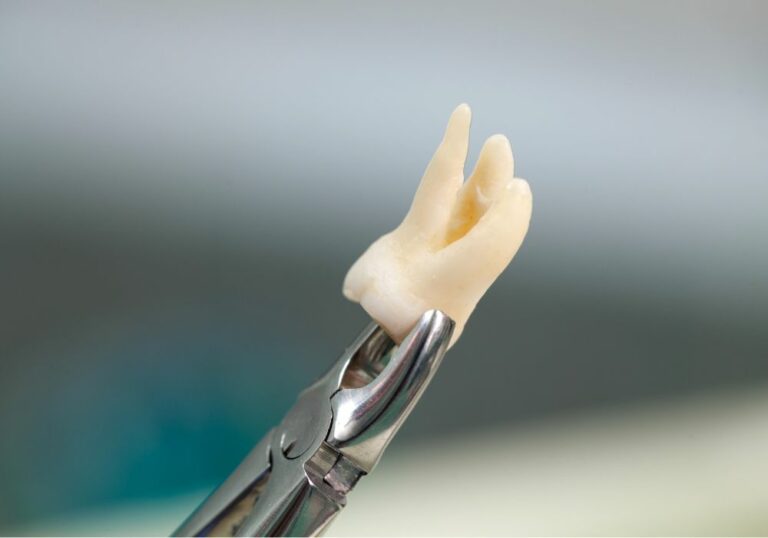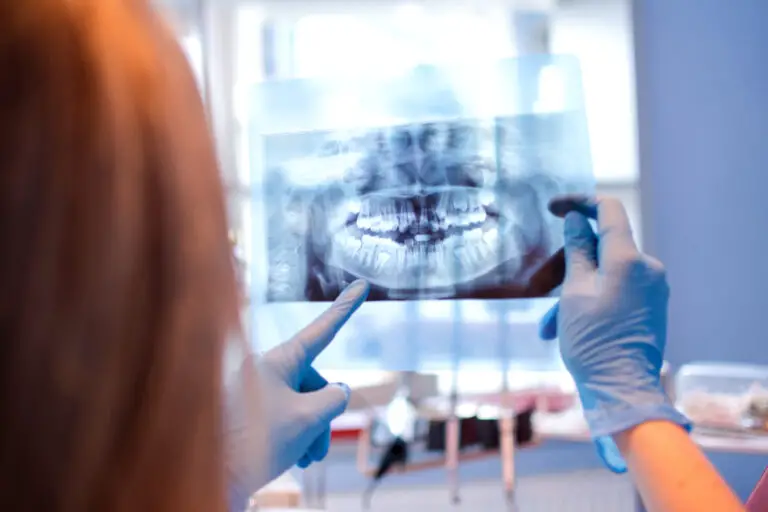Eating an apple is often touted as a healthy snack option. The old adage says “an apple a day keeps the doctor away.” Apples are nutritious, packed with fiber, vitamin C, and antioxidants. But when it comes to your dental health, you may wonder if you need to brush your teeth after eating this fruit. There are a few factors to consider when determining if and when you should brush after apple consumption.
How Apples Affect Your Teeth
Apples are acidic fruits. The acids in apples include malic acid and ascorbic acid (vitamin C). When you eat an apple, these acids interact with the enamel on your teeth.
The enamel is the outermost layer of your teeth. It’s the hardest substance in the human body. But it’s not invincible.
Acids soften and erode tooth enamel. This erosion makes teeth more vulnerable to cavities and other dental issues.
However, apples are only mildly acidic. Other popular fruits like oranges, grapefruits, and lemons are much more acidic. And acidic beverages like sodas and sports drinks can be even more damaging than citrus fruits.
So while apples have some acidic content, their impact is relatively minimal. An occasional apple is not likely to cause significant enamel erosion.
Risk Factors for Tooth Erosion

Several factors influence how much effect apples have on your tooth enamel:
- Frequency of consumption: Eating apples daily or several times a day is more damaging than occasional consumption.
- Contact time: How long the apple acid is in contact with your teeth also matters. Slowly snacking on an apple over an hour gives more time for erosion.
- Acid content: Varieties like Red Delicious, Fuji, and Braeburn tend to be less acidic than Granny Smith or Honeycrisp apples.
- Dental problems: If you already have weakened enamel, eating acidic foods accelerates erosion.
- Time of consumption: Eating apples between meals is worse than with meals, as increased saliva production during meals helps neutralize acids.
So if you have weakened enamel and eat Honeycrisp apples constantly throughout the day, you’ll likely experience more erosion than someone who eats a Braeburn apple with lunch and has healthy teeth. But for most people who eat apples in moderation, the acids have minimal effect on tooth health.
Should You Brush After Eating Apples?
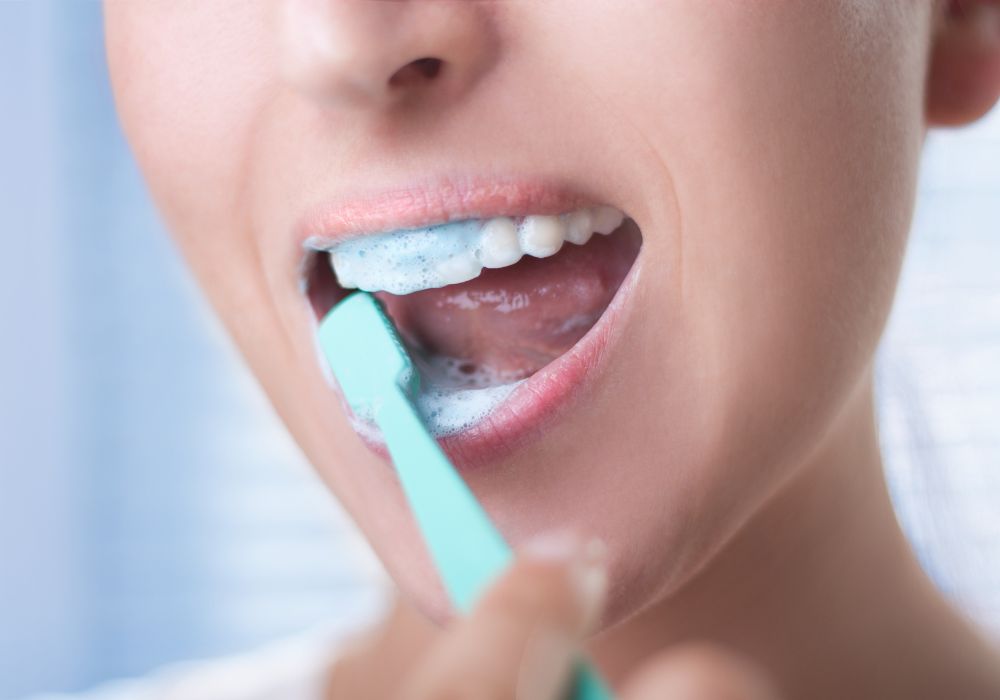
So do you need to brush immediately after eating an apple, or is it okay to wait until your regular brushing routine? Here are some guidelines:
- After meals: If you eat an apple at breakfast, lunch, or dinner, just brush as normal after that meal. The increased saliva production will help clear away acid, and brushing will remove any food debris.
- As a snack: If apples are your between-meal snack, consider rinsing your mouth with water and brushing lightly. This quick brushing removes excess acid and food residue.
- Before bed: It’s best to wait at least 30 minutes after eating an apple before brushing at night. Acids soften enamel, so brushing too soon can remove more enamel than necessary.
- With braces: The nooks and crannies of braces and other dental appliances trap food particles. If you wear braces, thoroughly brush after eating apples to avoid cavities or enamel issues.
You don’t need to rush to brush immediately after finishing an apple. But taking a few minutes to swish water or lightly brush within an hour helps clear away acid and debris. Be sure to wait 30 minutes before your bedtime brushing routine.
Protecting Teeth After Eating Acidic Foods
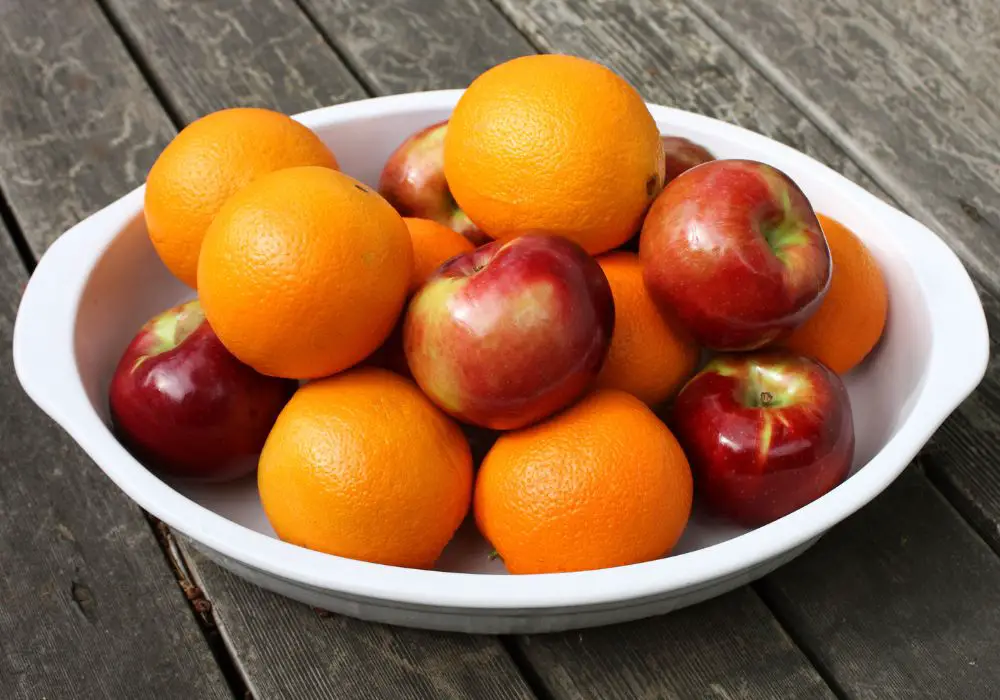
If you want to minimize the impact of acidic foods like apples on your teeth, consider these tips:
- Rinse or drink water: Swishing water around your mouth helps wash away food debris and acid.
- Chew sugar-free gum: Chewing gum produces more saliva to dilute and neutralize acid.
- Eat cheese: Eating cheese raises mouth pH after acidic foods.
- Use fluoride: Fluoride treatments or fluoride-containing toothpaste strengthens enamel against acid.
- Avoid brushing too soon: Wait at least 30 minutes before brushing after acidic foods.
- Get dental treatments: Talk to your dentist about sealants or fluoride treatments to protect your teeth.
Making a few small changes can help prevent extensive enamel erosion when you eat acidic fruits like apples.
The Benefits of Apples for Teeth
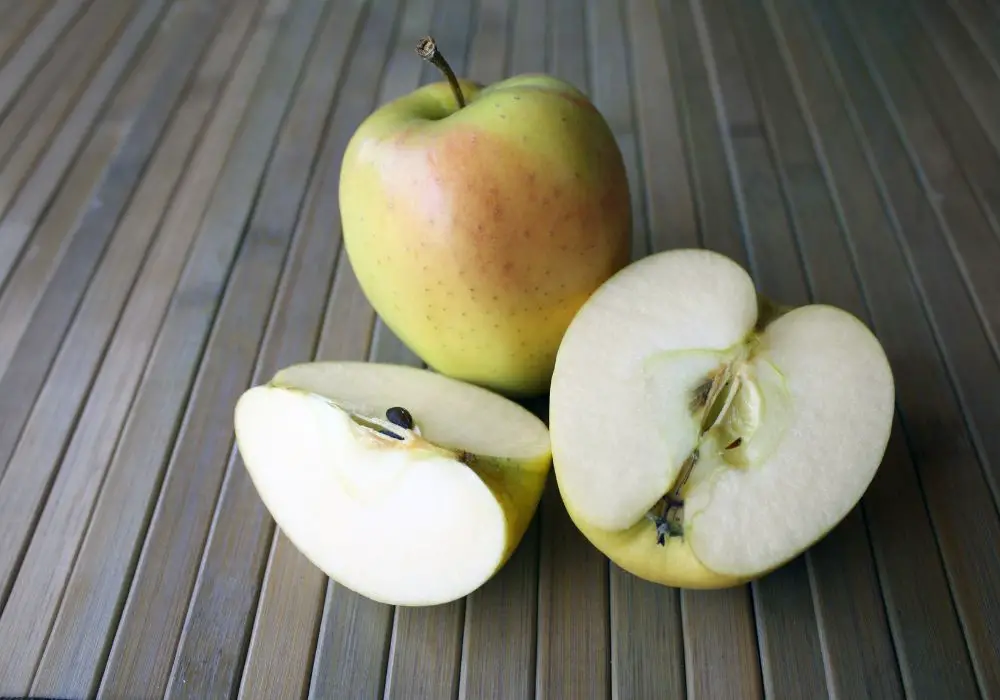
While apples are acidic, they also provide some benefits for your dental health:
- Cleansing: The crisp texture of apples helps mechanically remove plaque and debris from tooth surfaces and gums.
- Stimulates saliva: Chewing apples prompts increased saliva flow. Saliva washes away food and helps neutralize acids.
- Source of vitamins: Apples provide vitamin C, which is needed for healthy gums. They also have calcium which strengthens teeth.
So while apples are acidic, they also provide cleansing, stimulation of saliva flow, and important vitamins and minerals for oral health. The combination of these positives and negatives means apples end up having a neutral effect, rather than drastically hurting or helping your teeth.
How to Eat Apples for Dental Health

You don’t need to avoid apples for fear of destroying your enamel. Just follow these tips to enjoy apples without harming your teeth:
- Eat apples as part of meals: The saliva boost during meals helps clear away acid.
- Chew thoroughly: Chewing apple slices produces more saliva and distributes acid.
- Rinse after eating: Swish water in your mouth to wash away debris and acid.
- Wait to brush: Don’t brush for 30 minutes after eating apples or other acidic foods.
- Limit snacking: If you do snack on apples, rinse and brush lightly afterward.
- Alternate acidic and alkaline: Swap out apples for less acidic fruits or non-acidic foods like cheese.
- Protect teeth: Talk to your dentist about sealants or fluoride treatments if you have enamel issues.
With smart snacking habits, you can satisfy sweet cravings with apples without putting your teeth at serious risk of damage.
Answering Common Questions about Apples and Dental Health

Here are answers to some frequently asked questions about the impact of apples on teeth:
Are apples good or bad for your teeth?
Apples are neither inherently good nor bad. They have a combination of positives and negatives. Apples are mildly acidic, which could erode enamel over time. But they also stimulate saliva production and provide vitamins and minerals for oral health. Overall, apples are fine for teeth in moderation.
Should I avoid apples if I have braces or dental work?
No, you don’t need to completely avoid apples with braces or dental appliances. Just be diligent about brushing and flossing after eating apples. The nooks and crannies around braces trap food particles that cause cavities and decay if not removed. Thorough cleaning is key.
How long after eating an apple should I wait to brush?
Wait at least 30 minutes after consuming any acidic food, including apples, before brushing teeth. The softened enamel is vulnerable immediately after eating acidic foods, so brushing too soon can remove more enamel than necessary.
Is it ok to eat apples at night?
It’s best to avoid apples or any acidic food before bedtime. Saliva production drops while you sleep, so there’s less natural defense against the acids. Stick with non-acidic fruits like bananas or melons if you want a bedtime snack.
Should I use mouthwash after eating apples?
You can swish with water after eating apples rather than using mouthwash. The water helps rinse away acid and food debris. Mouthwashes aren’t necessary after eating and may actually dry out the mouth more. Just be sure to wait 30 minutes before using fluoride mouthwash.
Key Takeaways: Apples and Your Teeth
- Apples are mildly acidic, containing malic and ascorbic acid. These acids could damage enamel over time.
- Frequency of consumption, variety, dental health, and other factors affect sensitivity to apple acidity.
- Brushing lightly after apple snacking helps clear debris. Avoid brushing for 30 minutes after consumption.
- Rinsing with water, chewing gum, eating cheese, and using fluoride protects teeth after eating acidic foods.
- Apples provide benefits too, like cleansing teeth, stimulating saliva, and providing vitamins and minerals.
- Enjoy apples in moderation as part of meals, followed by thorough brushing and flossing. Wait 30 minutes before brushing at night.
With smart habits, you can safely enjoy crisp, delicious apples without putting your dental health at risk!
Conclusion
While apples have some acidic content, their dental effects are mixed. Apples may erode enamel over time, especially with frequent consumption. But they also provide cleansing and vitamins for oral health. By brushing carefully after eating apples, waiting 30 minutes before brushing at night, and enjoying apples in moderation with meals, you can avoid significant damage to your teeth. Apples can be part of a healthy diet and dental hygiene routine. With proper dental care habits, occasional apple snacking does not require rushing to brush your teeth.
FAQ
Should I avoid apples if I have sensitive teeth?
If you have sensitive teeth, you may want to be cautious about eating acidic foods like apples. The acidity can irritate sensitive tooth surfaces and make them more vulnerable to decay. Consider swapping apples for less acidic fruits like pears, melon, or bananas. If you do eat apples, be diligent about rinsing your mouth afterwards.
How can I protect my enamel from apple acidity?
To help protect enamel, wait at least 30 minutes before brushing after eating apples. Rinse your mouth with plain water after eating. Use a straw when drinking apple juice to minimize contact with your teeth. Chew xylitol gum after apple consumption, as xylitol helps neutralize acids. Talk to your dentist about professional fluoride treatments to strengthen enamel.
What apple varieties are least damaging to dental health?
Red Delicious, Fuji, and Braeburn apples tend to be less acidic than Granny Smith or Honeycrisp varieties. So opting for the less acidic types may help minimize tooth erosion. Just be sure to practice good oral hygiene after eating any apple, including rinsing and waiting before brushing.
Is it safe to give apples to babies or toddlers?
Yes, apples are safe for babies and toddlers. The same precautions apply as for adults – rinse or wipe gums after eating, avoid apples before bedtime, and don’t let pieces remain in the mouth for extended periods. Apples can actually help clean emerging teeth and massage gums. Just don’t let apple slices replace teeth brushing.
What foods help neutralize apple’s acidity in the mouth?
Eating non-acidic dairy products like cheese, milk, or yogurt after apples can help neutralize acid and raise mouth pH. Other options include baking soda dissolved in water, sugar-free antacid tablets, sugar-free gum, or almonds. Rinsing with plain water also helps wash away acid.

